Data integration is essential for businesses to connect their systems, reduce inefficiencies, and improve decision-making. With the rise of SaaS platforms, tools that unify data across applications are more important than ever. Here’s a quick overview of the top tools for cross-platform data integration:
- GetKnown.ai: AI-driven platform for automating customer interactions and backend operations.
- Estuary Flow: Real-time data streaming with low latency and batch processing.
- Celigo: Prebuilt connectors and drag-and-drop workflows for flexible integrations.
- Dell Boomi: Cloud-native, scalable platform with extensive API management.
- Fivetran: Automated ETL solution with a focus on simplicity and prebuilt connectors.
- Informatica IICS: Cloud-native platform with AI-driven data discovery and advanced security.
- Microsoft Azure Data Factory: Serverless solution with hybrid data movement and visual authoring.
- SnapLogic: Elastic platform with a user-friendly interface and AI-powered tools.
- Talend Data Integration: Open-source option with big data processing and extensive connectors.
- IBM DataStage: Enterprise-grade platform with parallel processing and advanced security.
Quick Comparison
| Tool | Key Features | Pricing Model | Best For | Connector Count | G2 Rating |
|---|---|---|---|---|---|
| GetKnown.ai | AI-driven tasks, lead generation | Tiered plans (Base to Pro) | Customer automation | Custom | Not rated |
| Estuary Flow | Real-time streaming, CDC | Usage-based | Real-time analytics | 200+ | 4.5 |
| Celigo | Prebuilt templates, visual workflows | Subscription/usage-based | E-commerce, SaaS companies | 500+ | 4.6 |
| Dell Boomi | Cloud-native, API management | Starts at $550/month | Mid-market to enterprise | 200+ | 4.3 |
| Fivetran | Automated schema drift, prebuilt connectors | MAR-based | Data warehousing | 300+ | 4.2 |
| Informatica IICS | AI-driven discovery, cloud-native | Custom pricing | Large enterprises | 200+ | 4.4 |
| Azure Data Factory | Serverless, hybrid data movement | Pay-per-use | Microsoft ecosystem users | 90+ | 4.5 |
| SnapLogic | Elastic scaling, drag-and-drop interface | Starts at $1,000/month | Citizen integrators | 500+ | 4.0 |
| Talend | Open-source, big data processing | Free or $12,000/year | Technical teams | 800+ | 4.0 |
| IBM DataStage | Parallel processing, enterprise security | Custom enterprise pricing | Large organizations | 50+ | 4.4 |
Key Takeaway: Choose a tool based on your business size, technical expertise, and integration needs. For real-time analytics, consider Estuary Flow. For enterprise-grade security, IBM DataStage or Informatica IICS are strong options. For user-friendly interfaces, SnapLogic and Celigo stand out.
🔥 Top 10 Data Integration Tools You MUST Know in 2025! 🚀
1. GetKnown.ai – AI Agents for Businesses
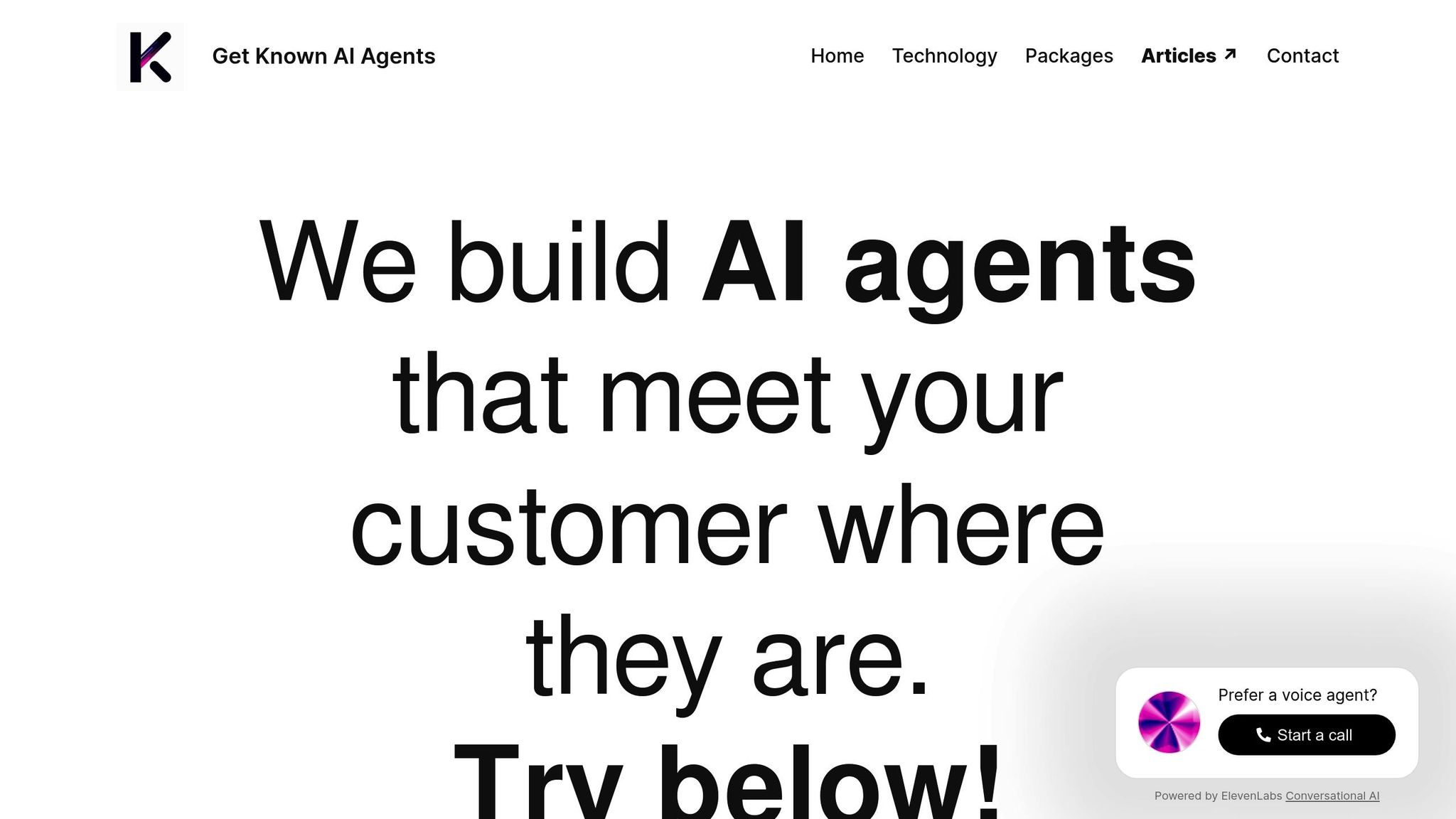
GetKnown.ai is reshaping how businesses interact with customers by seamlessly integrating their data systems. Unlike older tools that rely on manual configurations and rigid workflows, GetKnown.ai harnesses advanced AI to simplify operations and cut down on repetitive tasks.
The platform focuses on automating tasks like lead generation, customer support, personalized recommendations, appointment scheduling, data collection, and e-commerce processes. By bridging customer engagement with backend operations, GetKnown.ai offers a smarter way to manage interactions. Let’s dive into some of its standout features.
Connector Availability and Range
One of the key strengths of GetKnown.ai lies in its ability to connect with a wide variety of business applications. By combining AI with large language models, the platform ensures smarter and more efficient data flow between systems. It integrates seamlessly with tools like CRM systems, file storage platforms, ticketing systems, and ERP solutions. This vast range of connectors allows businesses to enhance their existing tech stacks without the need for major overhauls.
To tackle the complexity of managing multiple SaaS tools, GetKnown.ai employs "connector intelligence", which automates the creation and customization of connectors based on specific business requirements. This not only simplifies the integration process but also ensures that businesses can operate more efficiently without disrupting their workflows.
Flexible Pricing Options
GetKnown.ai offers three pricing tiers to accommodate businesses at different stages of automation.
- The Base plan is perfect for businesses just starting out, offering essential AI assistant features.
- The Plus plan adds capabilities like lead generation for companies looking to expand their automation efforts.
- The Pro plan includes full system integration and all customer interaction tools, catering to businesses with advanced automation needs.
This tiered approach ensures that companies, regardless of size or complexity, can find a plan tailored to their goals.
Scalability and Performance
The platform is built to handle the increasing demands of modern AI workloads. Its modular design allows it to grow alongside a business’s needs, ensuring that it remains effective as data volumes expand. Additionally, GetKnown.ai employs test-time scaling, which allocates extra computational resources during critical moments to maintain high-quality interactions. This ensures consistent performance, even as workloads increase.
Security and Compliance
Data protection is a top priority for GetKnown.ai. The platform uses robust encryption and secure protocols to safeguard sensitive information. With AI-driven compliance tools, businesses can reduce compliance costs by 30–50% and speed up incident detection and response times by up to 60%.
GetKnown.ai also adheres to strict regulations like GDPR and CCPA by regularly auditing and cleaning data to ensure compliance. Real-time monitoring helps detect and address any unusual system activities, providing an added layer of security. These features make GetKnown.ai a reliable choice for businesses seeking a secure and unified data integration solution.
2. Estuary Flow
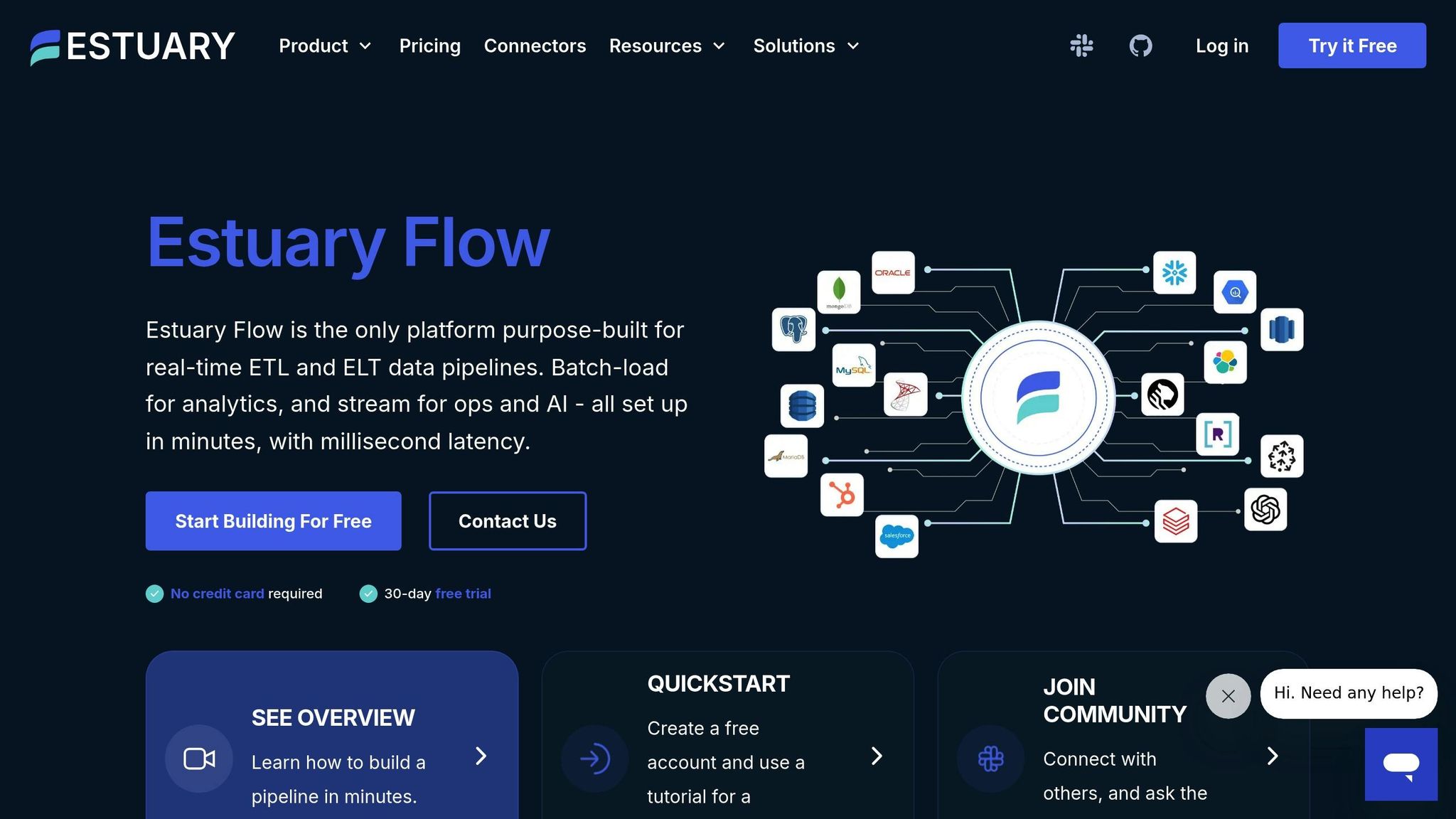
Estuary Flow is a powerful tool that connects data silos, offering both real-time and batch processing to ensure smooth and efficient data movement across platforms. What sets it apart is its streaming-first approach, which seamlessly integrates real-time and batch processing. With the ability to handle massive data volumes at lightning-fast speeds – sub-second latency, to be exact – it’s a go-to solution for businesses that need instant access to data insights. Now, let’s dive into its connector variety, scalable performance, and robust security setup.
Connector Availability and Diversity
Estuary Flow boasts an impressive library of over 200 pre-built ETL connectors. These cover everything from databases and data warehouses to SaaS applications and cloud platforms. It supports both real-time and batch data transfers, offering unmatched versatility. The platform also integrates the Airbyte protocol for batch-based connectors while featuring native database connectors and real-time SaaS integrations. Need a new connector? No problem – its open protocol allows users to add custom ones. The platform streamlines data integration through three key components: capture, collections, and materialization, enabling end-to-end data flows from databases, APIs, and other systems.
Scalability and Performance
When it comes to scaling, Estuary Flow doesn’t disappoint. It can handle active workloads at an impressive 7GB/s CDC (Change Data Capture) from databases of any size. Businesses using Estuary Flow have reported significant cost savings. For example:
- Headset cut Snowflake compute costs by 40%.
- Livble reduced Snowflake expenses by 50%.
- Recart achieved sub-second event ingestion to power live campaign dashboards.
The platform uses incremental materialization to keep streaming data transformations updated in real time. Plus, it’s built with reliability in mind, featuring fault-tolerance mechanisms like checkpointing, state persistence, retry systems, and exactly-once processing guarantees.
Security and Compliance Features
Estuary Flow takes security seriously. Its infrastructure is immutable, operates on a zero-trust network model, and includes RBAC (Role-Based Access Control) with centralized access management. The platform meets strict compliance standards, including SOC 2 Type II certification with no exceptions, as well as adherence to HIPAA, GDPR, CCPA, and CPRA regulations. To help users meet local regulatory requirements, all data processing and storage occur within regional boundaries.
Risk is further minimized by separating the control plane from the data plane. Deployment options are flexible, offering public cloud, private VPC, and self-hosted (BYOC) configurations. For businesses prioritizing security, private deployments allow full control over data within their own infrastructure. Additional safeguards include OS hardening and a centralized, token-based access model for full auditability at the infrastructure level.
Estuary Flow’s combination of speed, scalability, and security makes it a standout choice for businesses looking to streamline their data operations.
3. Celigo
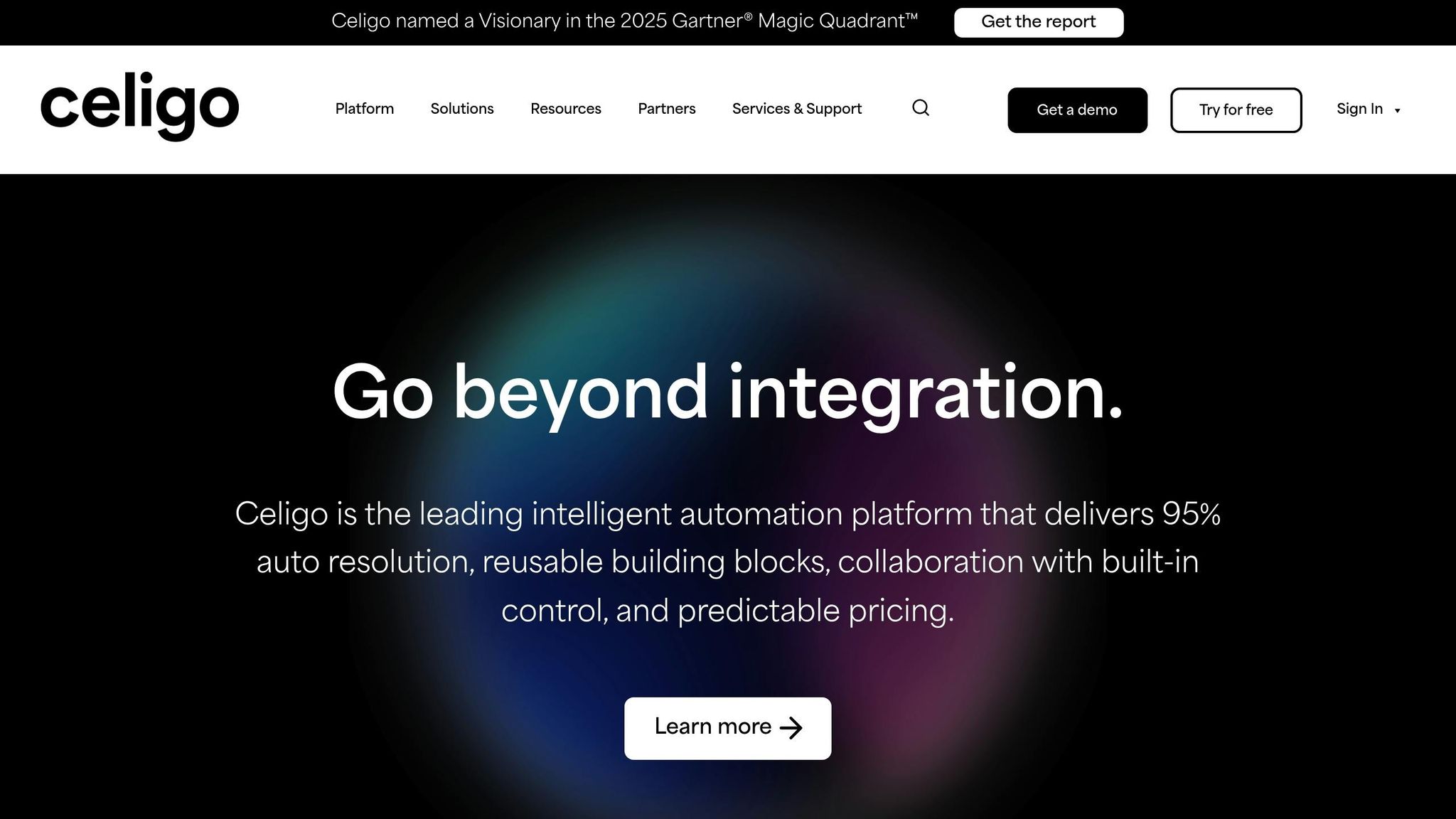
Celigo connects various business applications through a vast marketplace of prebuilt connectors. It combines drag-and-drop workflows with advanced enterprise integrations, offering flexible pricing and robust security features.
Connector Availability and Diversity
Celigo’s Integration Marketplace boasts an extensive collection of prebuilt integrations across numerous business categories. It supports hundreds of applications, including popular systems like NetSuite, Salesforce, Shopify, and HubSpot. Beyond these well-known platforms, Celigo covers a wide array of functions such as 3PLs, AI/ML, Analytics, CRM, Ecommerce, ERP, Finance & Accounting, HR, Marketing & Sales, and EDI/B2B Trading Partners.
For added flexibility, Celigo provides universal connectors that work with protocols like HTTP, FTP, JDBC, AS2, GraphQL, Webhooks, and Wrapper. This ensures compatibility with virtually any system that supports these standard protocols.
The platform continuously updates its connector library. For instance, in September 2024, Celigo introduced 18 new HTTP connectors for services such as Oracle Field Service Cloud and Twilio SendGrid, further expanding its integration options.
Next, let’s dive into how Celigo’s pricing model accommodates businesses of all sizes.
Pricing Model and Affordability
Celigo’s tiered pricing structure is designed to suit businesses from startups to large enterprises with complex needs. It offers both subscription-based and usage-based pricing models, with higher tiers unlocking more advanced features.
Here’s a breakdown of Celigo’s pricing options:
| Edition | Ideal For | Endpoints | Workflows | Annual Cost Range | Support |
|---|---|---|---|---|---|
| Free Version | Testing basic integrations | 2 | 1 | $0 | N/A |
| Basic Edition | Small businesses with simple needs | Up to 5 | 1–3 | $12,800 – $25,500 | Limited/Email-based |
| Premium Edition | Growing businesses needing flexibility | Up to 25 | 5–10 | $16,500 – $73,300 | Enhanced, faster response |
| Enterprise Edition | Large organizations with complex needs | Unlimited | Unlimited | Custom pricing | 24/7 support with dedicated account manager and SLAs |
The average annual cost across all tiers is approximately $17,000. Smaller businesses typically pay between $12,800 and $25,500 per year, while larger organizations might spend anywhere from $16,500 to $73,300 annually. This flexible pricing allows businesses to start with smaller plans and scale up as their integration needs grow.
Now, let’s take a closer look at Celigo’s approach to security and compliance.
Security and Compliance Features
Celigo integrates strong security measures at every level of its platform to ensure safe, private, and compliant data transfers. The platform uses layered encryption – TLS 1.2+ for data in motion and AES-256 for data at rest. Stored credentials are further secured with AES-256 or pbkdf2 encryption.
A standout feature is Celigo’s approach to data handling. The platform does not store processed data persistently. Instead, it acts as a pipeline, transferring data between endpoints and deleting it immediately after successful delivery. Error data may be retained for 30 days or more, depending on the license, but all in-process data is erased upon integration completion.
Access control is another priority, with features like granular role-based permissions, two-factor authentication (MFA), and single sign-on (SSO). Administrators have full control over user access and permissions, ensuring secure management of accounts and applications. Additionally, Celigo provides detailed audit trails, tracking account activity for up to one year and monitoring changes throughout the integration lifecycle.
Celigo complies with a wide range of regulatory standards, including EU/UK GDPR, California CCPA/CRPA, Nevada Chapter 603-A, New York SHIELD Act, Virginia Consumer Data Protection Act (VCDPA), and Texas Data Privacy and Security Act (TDPSA). It is also certified under the US, EU, UK, and Swiss Data Privacy Frameworks. For additional assurance, Celigo holds SOC-2 Type 2 certification and is HIPAA-ready and FERPA-ready. The platform undergoes annual penetration testing and quarterly vulnerability assessments to maintain its high security standards.
4. Dell Boomi
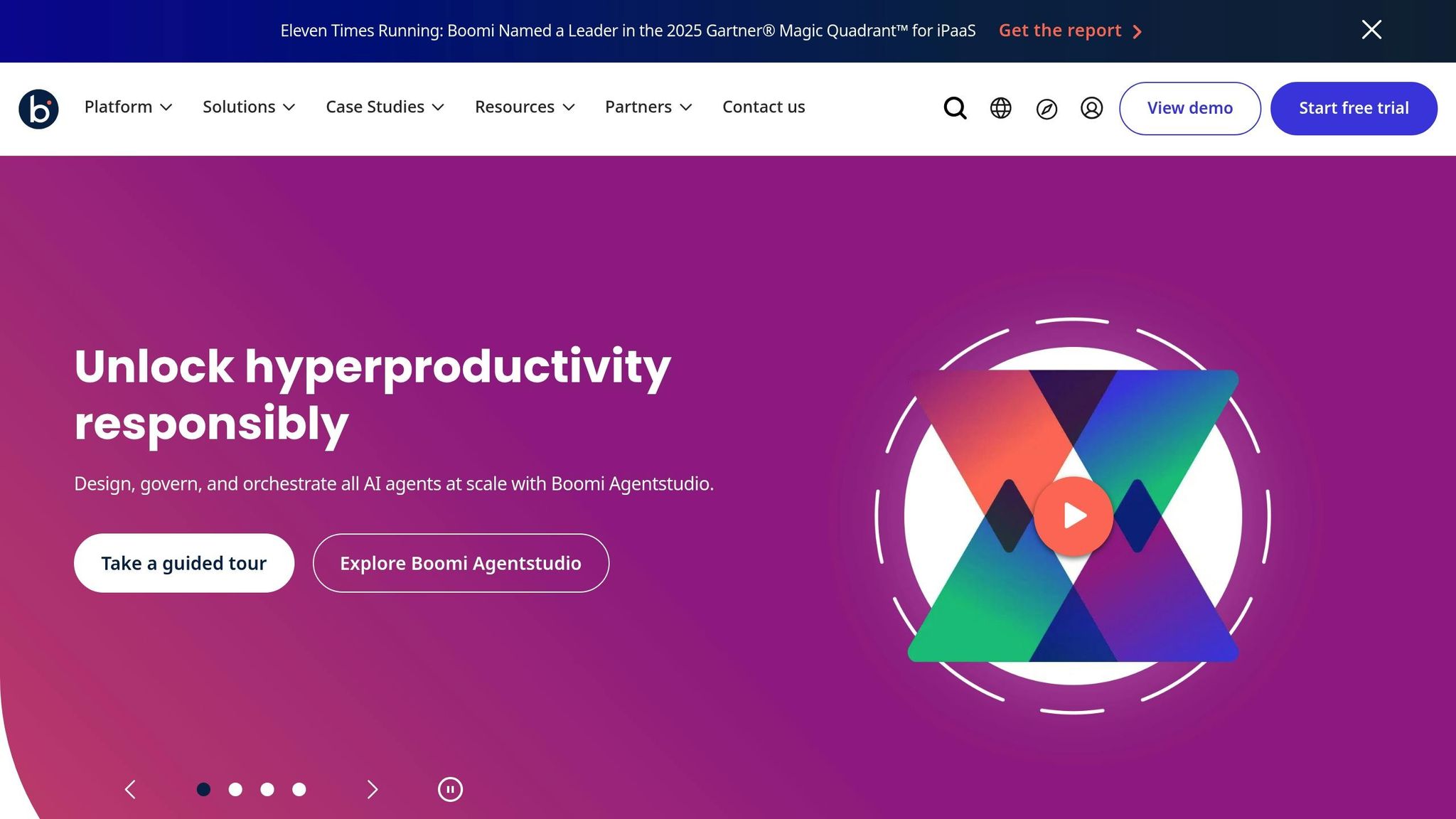
Dell Boomi is a cloud-native integration platform with a strong reputation, trusted by more than 20,000 customers worldwide.
Connector Availability and Diversity
Dell Boomi provides access to over 1,500 pre-built connectors, making it easier to integrate a variety of systems and applications. These connectors are divided into three main categories:
- Application Connectors: These support popular tools and platforms like CRM systems (Salesforce, Microsoft Dynamics, SugarCRM), ERP solutions (NetSuite, SAP, Oracle E-Business Suite), databases (SQL Server, MySQL, Oracle), and cloud services (Amazon S3, Google Cloud, Workday).
- Technology Connectors: These connectors enable communication using standard protocols, including messaging (JMS, AMQP, MQTT), web services (HTTP, SOAP, REST), file transfers (FTP, SFTP), and email integration (SMTP, IMAP, POP3).
- Event-driven Connectors: Designed for real-time data movement, these connectors ensure that information flows immediately when business events occur, rather than waiting for scheduled batch processes.
For situations where pre-built connectors don’t meet specific needs, Boomi offers a Connector SDK, allowing businesses to create custom connectors. The platform simplifies maintenance by automatically updating API versions and supports a variety of authentication methods, such as basic authentication, password digest, client certificates, and OAuth. These features enhance Boomi’s ability to adapt to different integration scenarios within its scalable architecture.
Scalability and Performance
Dell Boomi is built for flexibility, offering deployment options ranging from single-JVM Atoms to multi-node Molecules and Kubernetes environments. With its support for both parallel and batch processing, Boomi efficiently handles large data volumes. Its cloud-native design ensures that applications, data sources, and systems can connect from nearly any location, bypassing the limitations of traditional on-premises solutions.
At the core of its architecture is Boomi’s AtomSphere technology, which generates integration processes called "Atoms." These Atoms act as efficient bridges between cloud infrastructures and on-premises applications. The platform also includes tools for monitoring performance and resolving errors, ensuring smooth operations. Alongside its strong performance capabilities, Boomi places a high priority on security.
Security and Compliance Features
Dell Boomi takes a comprehensive approach to security, protecting data both in transit and at rest through encryption. It enforces fine-grained access controls with features like data masking and provides detailed activity logs for auditing. The platform meets key compliance standards, including SOC 2 Type II, HIPAA, GDPR, PCI DSS, ISO/IEC, FedRAMP, and StateRAMP requirements.
In August 2024, Boomi reaffirmed its commitment to security by successfully completing an IRAP reassessment for its Enterprise Platform. This reassessment highlights Boomi’s dedication to maintaining high security standards:
"With the temperature of the Australian security environment rising, maintaining strict standards for data protection and cybersecurity set out under the IRAP framework is more critical than ever, particularly as cross-agency and global cooperation become all the more necessary to mitigate risks."
"Boomi’s achievement of IRAP assessment further solidifies our commitment to providing the highest levels of security and data protection for Australian organisations, particularly those in government and critical infrastructure sectors. This accomplishment underscores our dedication to meeting the stringent requirements of handling sensitive information, particularly at a time when governments are facing increasing threats both locally and globally."
Boomi also allows organizations to select the geographic region for hosting their instances, ensuring compliance with data residency and sovereignty requirements. With over 20 years of experience as a FedRAMP Authorized iPaaS vendor, Boomi operates under a shared responsibility model, working closely with customers to maintain security at all levels.
5. Fivetran
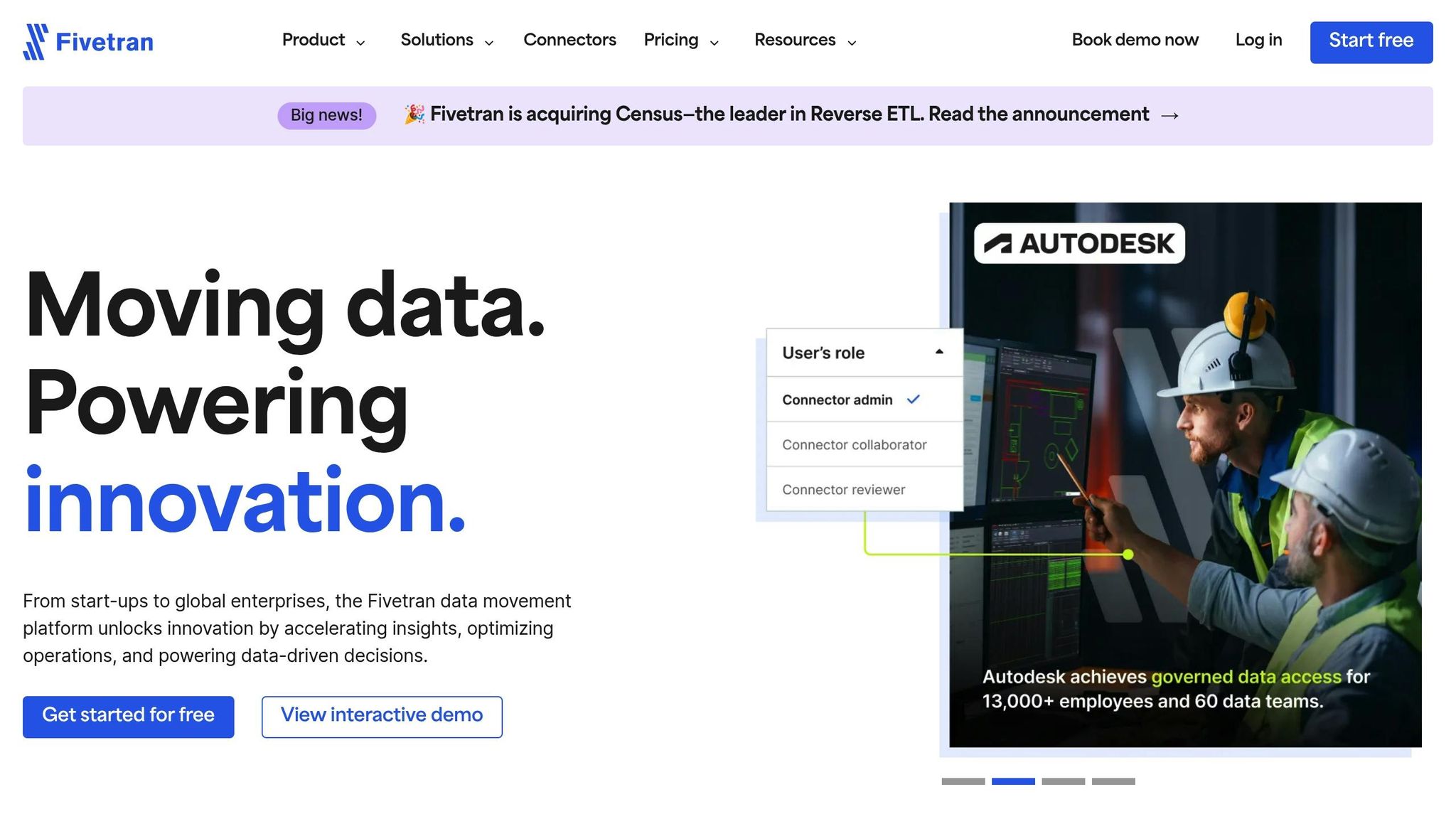
Fivetran simplifies ETL processes by automating data integration, making it easier to centralize data in warehouses or lakes. With a wide range of connectors, flexible pricing, and strong security measures, it’s a go-to platform for businesses looking to streamline their data workflows.
Connector Availability and Diversity
Fivetran boasts an impressive library of over 700 pre-built connectors, covering applications, databases, files, and events. This extensive selection allows businesses to integrate diverse data sources without needing complex technical setups.
Popular business tools like Salesforce, Google Sheets, Google Analytics 4, Facebook Ads, Google Ads, and HubSpot are supported, making it easier to connect critical applications. For database integration, Fivetran provides connectors for enterprise systems such as Oracle, PostgreSQL, SQL Server, SAP ERP, MongoDB, MySQL, and SAP HANA. The platform offers different connector types – "Lite", "High volume", and "Local data processing" – to meet varying data volumes and processing needs. For unique requirements, businesses can use Fivetran’s Connector SDK to create custom integrations.
One example of Fivetran’s capabilities is its role in setting up a secure data pipeline for a healthcare company. The phData team used Fivetran to extract data from Caboodle (Epic) SQL Server hosted on AWS and load it into a Snowflake cloud data warehouse via AWS PrivateLink.
Pricing Model and Affordability
Fivetran’s pricing model is designed to scale with usage, charging per million Monthly Active Rows (MAR). This volume-based approach offers tiered plans, where higher usage leads to lower rates. Starting in March 2025, MAR pricing will apply at the connection level instead of the account level, potentially affecting businesses with multiple connections [59,63].
Here’s an overview of Fivetran’s pricing plans:
| Plan | Starting Price | Features |
|---|---|---|
| Free Plan | $0 | Up to 500,000 MAR and 5,000 monthly model runs |
| Standard Plan | $500 per million MAR | Core integration features |
| Enterprise Plan | $667 per million MAR | Advanced security and support |
| Business Critical Plan | $1,067 per million MAR | Maximum security and compliance |
Fivetran also offers volume discounts, with annual contracts starting at a 5% discount. For transformations, charges are based on successful monthly model runs, with the first 5,000 runs included for free. As volume increases, the cost per run decreases.
"Each connection follows a separate cost curve based on usage. As your usage increases, either organically or by adding new tables, your spend rate automatically declines. This means the more you use Fivetran, the more you save."
The upcoming pricing changes are expected to lower costs for most users, though businesses with numerous equal-sized connections might see higher expenses. Meanwhile, those with one dominant connection could benefit from reduced rates.
Security and Compliance Features
Fivetran prioritizes security and compliance to ensure safe data integration across platforms. The platform uses advanced encryption (TLS 1.2+) to protect data, credentials, and keys both in transit and at rest [64,65]. It complies with major standards such as SOC 1 & 2, GDPR, CCPA, HIPAA BAA, ISO 27001, PCI DSS Level 1, and HITRUST. Additionally, Fivetran adheres to over 100 global data protection frameworks.
"Fivetran’s multifaceted protection complies with over 100 global data regimes." – Seth Batey, Data Protection Officer, Director, Associate General Counsel-Privacy, Fivetran
The platform includes features like column blocking and hashing, which prevent sensitive data from being replicated or allow it to be anonymized before reaching its destination. Customers can also choose data residency options across 20+ cloud regions.
Access controls are robust, with Single Sign-On (SSO) via SAML 2.0 and explicit customer approval required for Fivetran employees to access data [64,65]. Permissions follow the principle of least privilege, requiring only READ access for databases and API applications, and CREATE access for destinations. Production infrastructure is secured through hardened bastion hosts with multi-factor authentication.
Fivetran offers deployment options like SaaS, Hybrid, and Self-Hosted (HVR) to accommodate different security needs. The company also follows a responsible disclosure policy for vulnerabilities and conducts regular Privacy Threshold Assessments (PTAs) and Privacy Impact Assessments (PIAs) based on ISO privacy standards [66,67].
6. Informatica Intelligent Cloud Services (IICS)
Informatica Intelligent Cloud Services (IICS) is a cloud-native platform designed to handle enterprise-level data integration. With its consumption-based pricing and an extensive library of connectors, it helps businesses simplify data workflows while managing costs and maintaining flexibility.
Connector Availability and Variety
IICS provides a wide range of no-code connectors, making it easy to integrate data across both on-premises and cloud platforms. It supports popular business tools like Salesforce, Oracle, and AWS S3. Its connector ecosystem spans multiple categories, including cloud data warehouses such as Snowflake, AWS Redshift, and Microsoft Azure Data Warehouse. These connectors are optimized to handle data loads efficiently using modern techniques.
IICS also supports various data formats like Avro, Parquet, and JSON through its cloud connectors. The Cloud Application Integration (CAI) service expands compatibility by supporting multiple protocols and data formats, ensuring seamless interaction with both modern RESTful APIs and older SOAP services. Updates have improved over 40 connectors, covering applications, SaaS platforms (like NetSuite, Microsoft Dynamics, and Salesforce), analytics tools such as Tableau, and major cloud platforms like Google Cloud, Amazon AWS, and Microsoft Azure.
Flexible Pricing Model
IICS employs a consumption-based pricing model, measured in IPUs (Informatica Processing Units), allowing businesses to scale and pay based on actual usage. This model includes all connectors at no extra cost. The IPU system offers several pricing options tailored to different needs:
| Pricing Model | Description | Key Benefits |
|---|---|---|
| Standard IPU | Pay-as-you-go model | Tracks usage flexibly and manages costs |
| Volume Tier Pricing | Commit to specific usage levels | Offers savings as usage increases |
| Flex IPU | Unused IPUs expire annually | Provides greater flexibility in usage |
Informatica highlights strong ROI metrics, including an average ROI of 413%, $1.08 million saved in maintenance and administration, and $1.25 million in direct cost savings. Customers often praise the platform’s cost efficiency and its ability to enhance system integrations, especially when paired with Master Data Management capabilities.
Scalability and Performance
IICS offers elastic scalability, using parallel processing and workload balancing to enhance performance and minimize latency. The platform automatically adjusts resources in response to demand, ensuring efficient operations without the need for manual adjustments. By leveraging cloud infrastructure, IICS dynamically scales resources as workloads evolve.
Real-world examples showcase its effectiveness. For instance, Paycor reduced data preparation time by 90% using IICS with Snowflake. Takeda transitioned 96% of its data to the cloud, accelerating clinical trials and enabling AI-driven use cases. Similarly, Citizens Bank created a unified customer view for real-time personalization, while RS Group streamlined legacy data systems with IICS’s cloud-native Master Data Management, building an AI-ready data framework.
Security and Compliance
As IICS scales to meet business demands, it also prioritizes security at every level. The platform offers enterprise-grade security features and compliance for regulated industries. Its low-code/no-code architecture includes reusable control panels and supports native execution in hybrid and multi-cloud environments.
IICS employs encryption, strict access controls, and audit trails to safeguard data. It supports a variety of deployment models, enabling organizations to choose configurations that best align with their security and compliance needs. Additionally, users can select different execution engines based on cost and performance priorities, striking a balance between savings and operational efficiency.
sbb-itb-a95661f
7. Microsoft Azure Data Factory
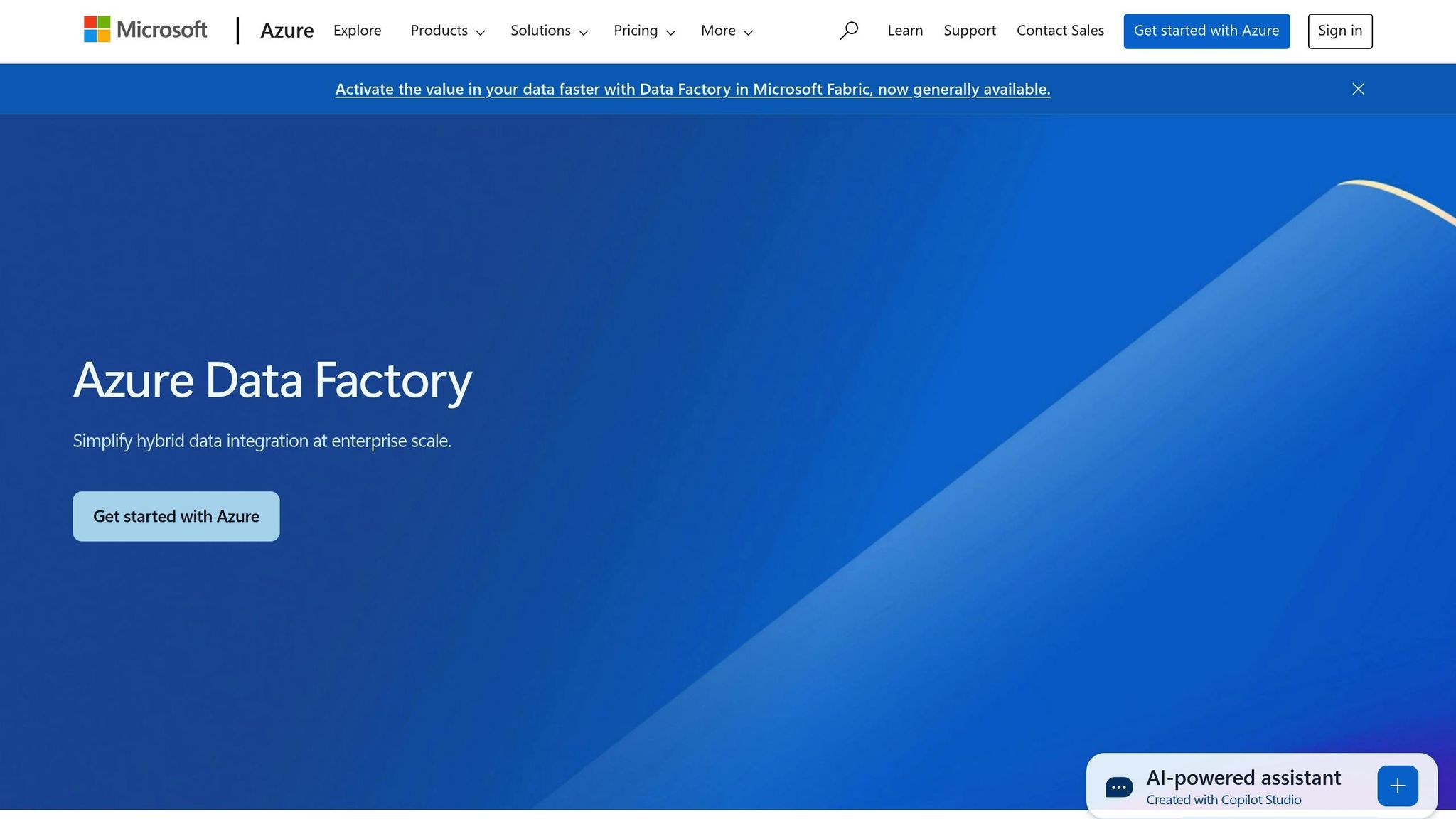
Microsoft Azure Data Factory stands out as a serverless, fully managed data integration service designed to streamline workflows across different platforms. With its extensive library of connectors and cloud-native design, it provides a robust solution for tackling data integration challenges at an enterprise level.
Connector Availability and Flexibility
Azure Data Factory offers over 90 built-in connectors at no extra cost, making it a versatile tool for both code-free and code-centric ETL and ELT processes. These connectors cover a wide range of Azure services, external databases, NoSQL systems like Cassandra and MongoDB, file storage options such as Amazon S3, and protocols including HTTP, OData, ODBC, and REST.
For unique integration needs, the platform provides flexible options. You can use ODBC, REST, or OData connectors for custom solutions, interact with RESTful or SOAP APIs for SaaS applications, or adopt a two-step process by transferring data to supported storage like Azure Blob or FTP before processing it within Azure Data Factory.
The platform also supports a variety of file formats, including Avro, JSON, Parquet, Excel, and XML, ensuring compatibility with diverse data sources.
Pricing Structure
Azure Data Factory operates on a pay-as-you-go model, charging based on actual usage rather than fixed costs. The pricing is broken down into key components like pipeline orchestration, data movement, and transformation activities. This approach allows businesses to scale resources efficiently, aligning costs with workload demands.
Scalability and Performance
Azure Data Factory’s serverless architecture ensures scalability, with the ability to handle large-scale enterprise workloads. It supports parallelism at multiple levels, optimizing data movement and processing. For example, Azure Integration Runtime can use up to 256 Data Integration Units (DIUs) per copy activity, providing the power needed for demanding tasks.
The platform is designed for high performance, utilizing control flows, single-copy activities, and parallel operations to enhance efficiency. With a 99.9% availability guarantee, Azure Data Factory ensures that scheduled activities start within four minutes, making it a reliable choice for critical operations.
To accommodate various workloads, the platform offers multiple compute configurations:
| Configuration | Worker Cores | Driver Cores | Total Cores | Workload Type |
|---|---|---|---|---|
| Small | 4 | 4 | 8 | Light workloads |
| Medium | 8 | 8 | 16 | Standard processing |
| Large | 16 | 16 | 32 | Heavy data transformation |
| Extra Large | 256 | 16 | 272 | Enterprise-scale operations |
Security and Compliance
Azure Data Factory is built with security at its core, boasting certifications like ISO 27001:2013, SOC 1/2/3, HIPAA BAA, and HITRUST. Data is protected through multiple layers, with credentials for cloud data stores encrypted using certificates managed by Microsoft, which are rotated every two years. All data transfers utilize HTTPS or TLS protocols, with TLS 1.2 as the standard.
"Azure Data Factory including Azure Integration Runtime and Self-hosted Integration Runtime does not store any temporary data, cache data or logs except for linked service credentials for cloud data stores, which are encrypted by using certificates." – Microsoft Learn
The platform integrates with Azure Role-Based Access Control (RBAC) for managing permissions and supports Azure Active Directory for secure authentication. It also allows for customer-managed encryption keys and integrates with Azure Key Vault for managing credentials and secrets.
For enhanced network security, Azure Data Factory supports Static IP address ranges, enabling more precise firewall and network access configurations. Additionally, it offers Azure AD Conditional Access Policies to provide extra layers of access control.
8. SnapLogic
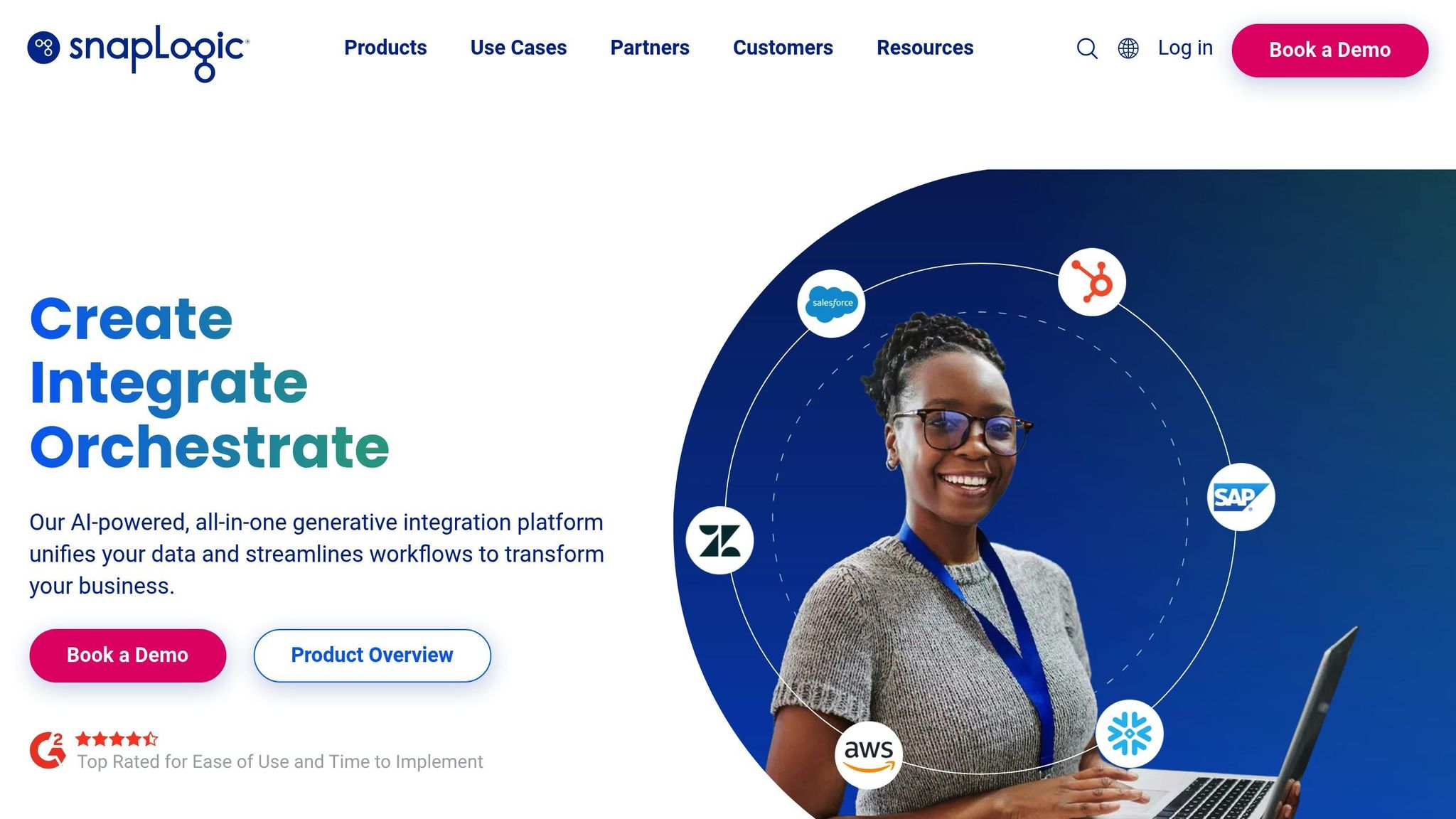
SnapLogic’s Platform for Generative Integration simplifies the process of connecting applications, databases, big data systems, devices, and APIs. Its visual drag-and-drop interface makes even the most complex workflows easier to manage, while still offering enterprise-grade capabilities.
Connector Availability and Diversity
SnapLogic boasts an extensive library of over 1,000 pre-built connectors, aptly named "Snaps." These Snaps are modular integration components tailored for specific applications or data sources, making cross-platform data integration more accessible and efficient. The Snap architecture organizes these connectors into six categories – Read, Parse, Transform, Flow, Format, and Write – allowing users to build intricate workflows with ease. For businesses with specialized requirements, SnapLogic enables the creation of custom Snaps using standard developer tools, ensuring flexibility and adaptability [96,97].
To speed up the integration process, SnapLogic leverages AI-powered tools like AutoSuggest and AutoPrep. These features consolidate functionalities that were previously scattered across multiple legacy systems, streamlining development and reducing complexity [97,98]. This robust connector library is a key factor in SnapLogic’s ability to handle large-scale, high-performance integrations.
Scalability and Performance
SnapLogic’s Elastic Integration Platform automatically adjusts to workload demands, ensuring efficient resource use without manual intervention. It supports parallel processing, enabling both high-throughput batch processing and real-time integrations, all while maintaining a minimal operational footprint [101,102]. For example, one company successfully connected 40 applications and processed over 15 million daily transactions with just 1.5 full-time employees. Organizations transitioning from legacy systems like PowerCenter to SnapLogic often report a 50% reduction in the number of integrations required, leading to significant savings in maintenance time and costs.
"SnapLogic is extremely powerful and I am always amazed at how fast it can process millions of rows of data. It makes it extremely easy to connect to sources like Salesforce, Snowflake, Jira, Zendesk, etc. It saves a lot of time." – Jacob Rasmussen, Data Engineer, Route
The platform’s cloud-based design incorporates advanced techniques to manage data throughput and increase pipeline concurrency, making it ideal for large-scale processing. Features like Stream Snaps for handling massive data volumes, data compression to optimize storage and transmission, and automated alerts for monitoring pipeline performance further enhance its efficiency.
Security and Compliance Features
SnapLogic prioritizes security with a stateless engine that only stores customer metadata. Endpoint credentials are encrypted using a public/private key model, while data on disk is secured in server-side encrypted Amazon S3 buckets. All platform communications are protected with SSL on port 443.
The platform meets stringent compliance standards, including SOC 1 Type 2, SOC 2 Type 2, SOC 3, and HIPAA-HITECH certifications. It also adheres to data privacy regulations like CCPA and GDPR. By leveraging AWS security features – such as ISO 9001, ISO 27001, and FISMA certifications – SnapLogic ensures robust data protection.
Authentication and access control are equally robust, offering Single Sign-On (SSO) support via SAML or Active Directory, and compatibility with providers like Open AM, OKTA, and Ping. Optional two-factor authentication and strict password requirements further enhance user security [103,104]. Additionally, SnapLogic has a Security Incident Response Plan in place, committing to notify affected customers within 48 hours of any security breach discovery.
9. Talend Data Integration
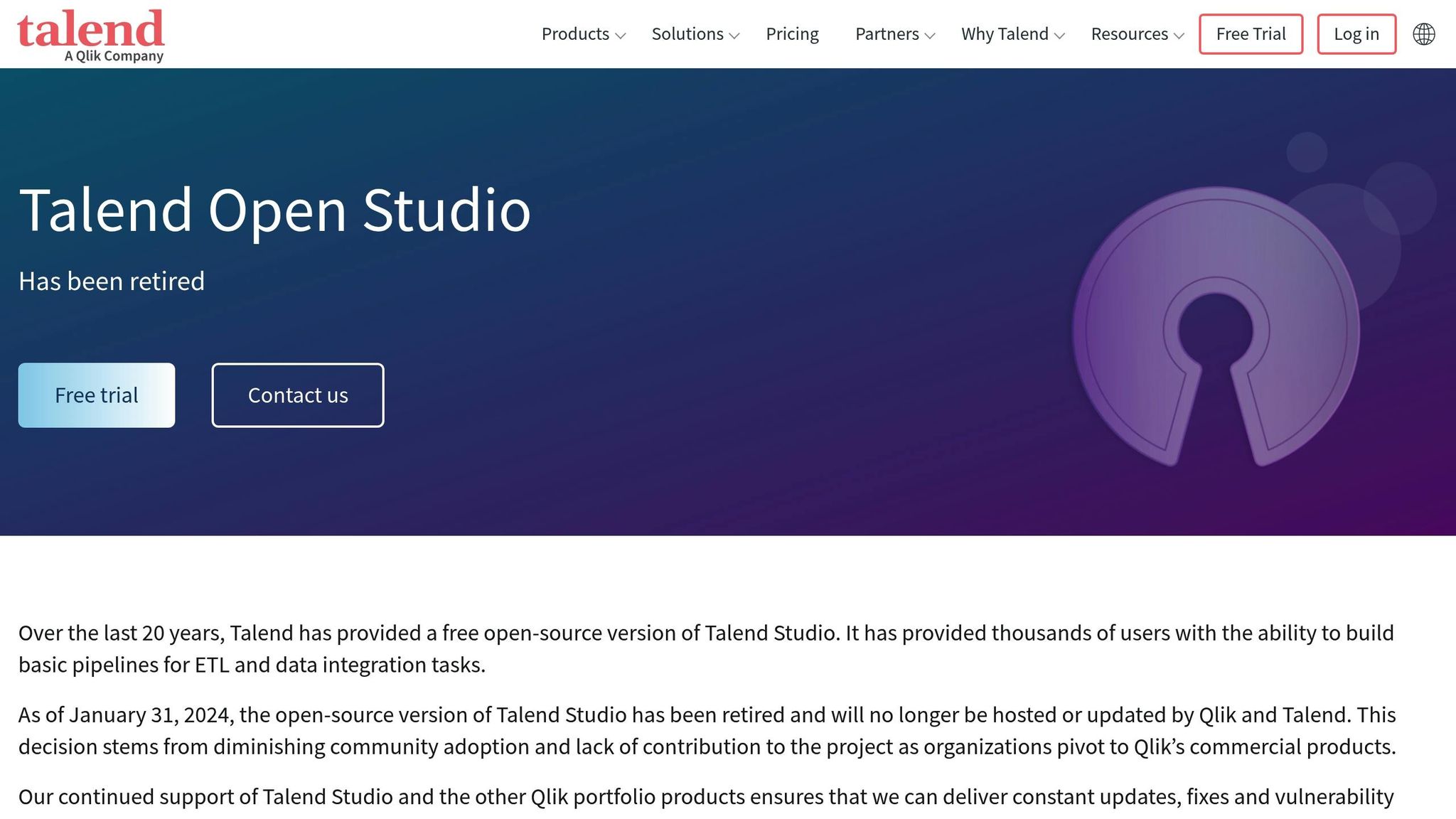
Talend Data Integration is a powerful platform designed to simplify data flows and address the challenges faced by modern enterprises. With its user-friendly interface and extensive connector library – featuring over 1,000 core and custom connectors – it enables smooth integration across a wide range of systems. These include traditional databases, cloud platforms, back-office applications, legacy systems, SaaS solutions, and IoT devices. The platform supports both batch and real-time processing, making it versatile for various use cases [15,107].
Talend’s connector library covers numerous categories, such as major databases like Oracle, Microsoft SQL Server, MySQL, and PostgreSQL; cloud storage systems like Amazon S3 and Azure Blob Storage; business applications including Salesforce, Workday, and NetSuite; and modern messaging systems like Kafka, RabbitMQ, and Azure Event Hubs. This broad range of connectors ensures seamless scalability and adaptability to different business needs.
The platform stands out for its scalability, leveraging Hadoop and Spark to enable parallel processing across multiple nodes and cloud environments. Performance tests have shown impressive results, with sorting, aggregation, and averaging speeds between 200,000 and 400,000 records per second when accessing data from disk, and up to one million records per second for in-memory processing.
"FileScale lets you take advantage of the entire [hardware] stack — multi-CPU architectures and multicore processors — to execute extremely fast operations on data sets", – Yves de Montcheuil, Talend’s vice president of marketing
Talend also employs MapReduce technology to handle data processing tasks efficiently. As noted, "The sorting, aggregation, calculation and transformation of data [during integration] are not that different than the processing Google does on Web page indexes".
Expanding on its robust framework, Talend Cloud offers cloud-native, serverless processing that dynamically scales across AWS, Azure, and Google Cloud. This elasticity reduces operational overhead while maintaining high performance. The platform also includes tools for resource profiling, tuning, caching, and error handling to further optimize its operations.
Security and compliance are key priorities for Talend. Its Data Fabric platform is hosted on AWS and Microsoft Azure, featuring global failover capabilities to ensure reliability. Talend holds numerous certifications, including SOC 2 Type 2, HIPAA (with BAA agreements), Cyber Essentials Plus, GDPR (via a Data Processing Addendum), and ISO/IEC 27001:2013 and ISO/IEC 27701:2019. It also participates in the CSA STAR program.
To help organizations meet regulatory requirements like CCPA, GDPR, and HIPAA, Talend offers features such as anonymization, pseudonymization with data masking, and machine learning-driven data quality assurance. These tools allow businesses to design and implement data controls within integration pipelines. Additionally, Talend supports managing opt-in consent and enforcing data rights, including the right to be forgotten, data accessibility, and rectification. Its security measures are reinforced by a robust business continuity plan and a well-defined incident response process [111,115].
10. IBM DataStage
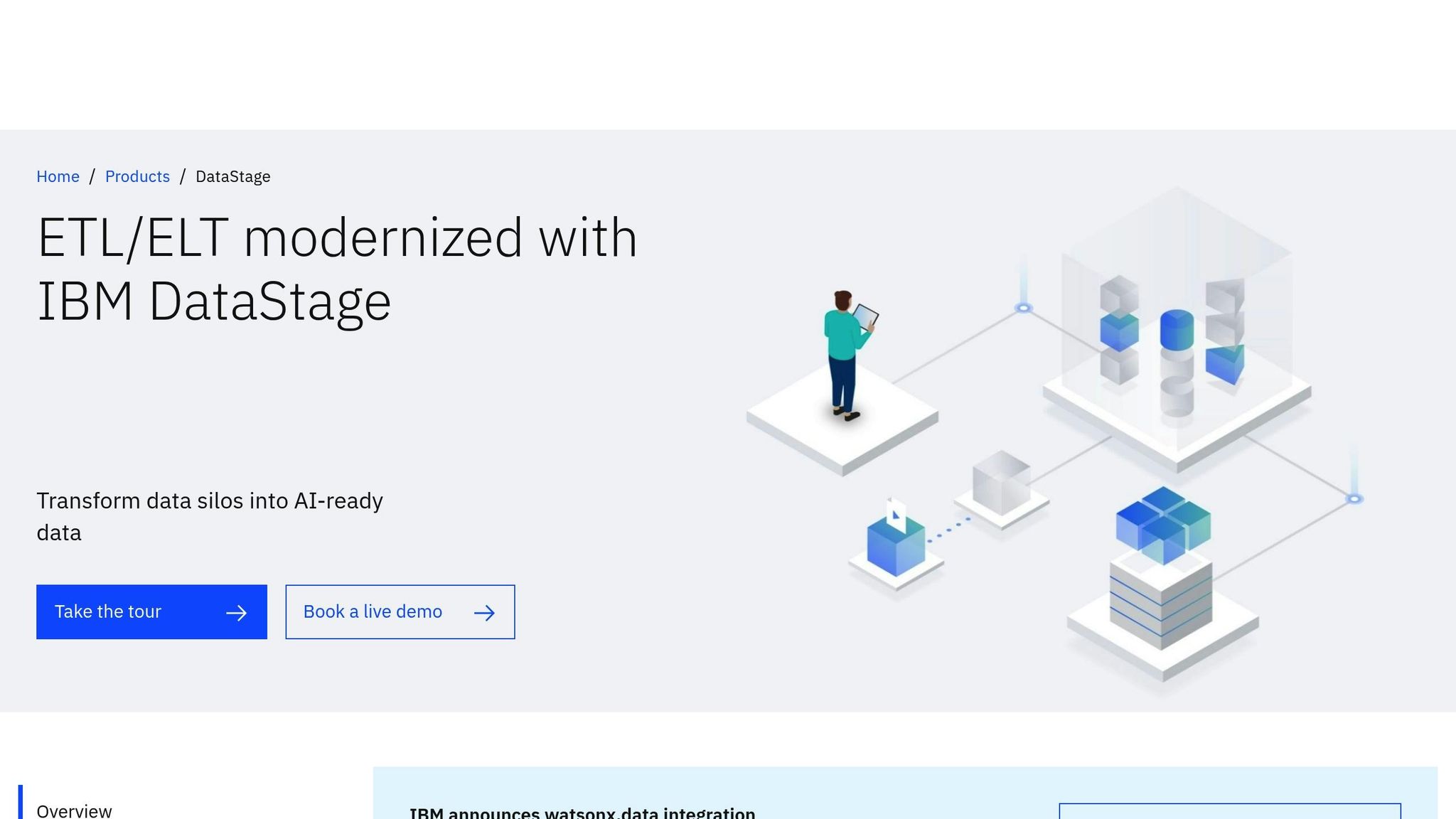
IBM DataStage is a robust solution designed for enterprise-level data integration across various platforms. Built on a scalable framework, it efficiently handles complex data processing while meeting the high performance and security standards demanded by large organizations.
Connector Availability and Diversity
IBM DataStage boasts an extensive library of connectors, supporting over 50 types of data sources. These range from traditional databases to modern cloud platforms and real-time processing systems, ensuring compatibility with virtually any enterprise data environment.
The platform supports major databases such as IBM Db2, Oracle, Microsoft SQL Server, PostgreSQL, and Teradata. It also integrates seamlessly with cloud storage solutions like Amazon S3, Azure Storage, and Cloud Object Storage. Additionally, enterprise applications like Salesforce.com, SAP applications, and Siebel are fully supported.
DataStage offers a flexible connection architecture with three levels of connections:
- Flow connections: Specific to individual DataStage flows and customizable with parameters.
- Project connections: Shareable among team members for collaborative workflows.
- Platform connections: Usable across multiple services and projects.
This structure ensures both security and efficiency in managing data integration processes.
For real-time processing, DataStage supports integration with Kafka, IBM WebSphere MQ, and distributed transactions, making it compatible with modern streaming architectures. Developers can also create custom connections using Java, enabling tailored solutions for unique business needs. This adaptability strengthens DataStage’s ability to handle diverse integration scenarios.
Scalability and Performance
IBM DataStage is built for high performance, leveraging a parallel processing engine that works seamlessly across grid, SMP, and MPP environments. This engine automatically balances workloads, reducing infrastructure management efforts by 65%–85%.
"DataStage has a best-in-breed, highly scalable parallel engine that processes substantial data volumes. Built-in auto workload balancing provides high performance and elastic management of compute resources." – IBM
The platform separates the creation of data-flow graphs from their parallel execution. This allows developers to concentrate on business logic while the system handles the technical complexities of parallel processing.
DataStage supports both ETL (Extract, Transform, Load) and ELT (Extract, Load, Transform) workflows, giving organizations the flexibility to choose the best approach for their needs. Features like Balanced Optimization automatically enhance job performance, and specialized stages, such as the Big Data File stage, streamline integration with Hadoop environments.
Security and Compliance Features
IBM DataStage adheres to major security and compliance standards, including DORA, GDPR, CCPA, SOX, PCI, and HIPAA. Its comprehensive security framework ensures data protection throughout its lifecycle.
The platform employs robust access controls, including user authentication, role-based permissions, and encryption for sensitive data both at rest and during transmission. Integration with IBM Key Protect enhances security by using hardware security modules (HSMs) for key management and encryption operations.
All communication with DataStage is secured using HTTPS with Transport Layer Security (TLS), safeguarding data during transmission. The platform also emphasizes data-centric security, protecting the data itself regardless of its location or access method.
In a notable example, Westfield Insurance integrated IBM Guardium and IBM QRadar with DataStage in 2025 to enhance data security and support their business growth. This real-world case highlights how IBM’s integrated security tools can protect sensitive information and ensure long-term reliability.
DataStage also includes audit capabilities to help organizations verify compliance measures and identify vulnerabilities before they escalate. With the global average cost of a data breach reaching $4.45 million in 2023 – a 15% increase over three years – DataStage’s security features offer critical protection for enterprise data assets.
Tool Comparison Table
Selecting the right platform for cross-platform data integration can make a big difference in efficiency and scalability. Below is a detailed comparison of popular tools to help you decide which one fits your needs.
| Tool | Key Features | Pricing Model | Best Use Cases | Connector Count | G2 Rating |
|---|---|---|---|---|---|
| GetKnown.ai | AI-driven customer interactions, lead generation, appointment scheduling, seamless system integration | Tiered plans (Base, Plus, Pro) | Businesses automating customer support and data collection | Custom integrations available | Not rated |
| Estuary Flow | Real-time data streaming, change data capture, low-latency processing | Free: 10 GB/month Cloud: $0.50/GB + $100/connector Enterprise: Custom |
Real-time analytics, streaming applications | 200+ connectors | 4.5 stars |
| Celigo | Pre-built integration templates, automated error handling, visual workflow designer | Subscription and usage-based options | E-commerce and SaaS companies | 500+ pre-built integrations | 4.6 stars |
| Dell Boomi | Cloud-native platform, drag-and-drop interface, API management | Starts at $550/month | Mid-market to enterprise organizations | 200+ connectors | 4.3 stars |
| Fivetran | Automated schema drift handling, pre-built connectors, zero-maintenance | Monthly Active Rows (MAR) based | Data warehousing, analytics teams | 300+ pre-built + 300+ API connectors | 4.2 stars |
| Informatica IICS | AI-powered data discovery, advanced data quality, cloud-native architecture | Custom pricing | Large enterprises, complex data environments | 200+ connectors | 4.4 stars |
| Microsoft Azure Data Factory | Serverless data integration, hybrid data movement, visual authoring | Pay-per-use model | Microsoft ecosystem users | 90+ built-in connectors | 4.5 stars |
| SnapLogic | Browser-based interface, self-service integration, elastic scaling | Starts at $1,000/month | Citizen integrators, business users | 500+ pre-built connectors | 4.0 stars |
| Talend Data Integration | Open-source option available, big data processing, data profiling | Open Studio: Free Commercial: $12,000/year |
Organizations with technical teams | 800+ connectors | 4.0 stars |
| IBM DataStage | Parallel processing engine, enterprise security, workload balancing | Custom enterprise pricing | Large enterprises, high-volume processing | 50+ data source types | 4.4 stars |
The table provides a quick snapshot of what each platform offers, but let’s dive deeper into some key considerations like pricing, integration capabilities, and usability.
Pricing Models
Platforms offer a mix of fixed and usage-based pricing. For predictable costs, Dell Boomi starts at $550 per month. On the other hand, Estuary Flow’s $0.50 per GB model adapts to fluctuating data volumes, which can be ideal for businesses with variable needs.
Connector Availability
While Talend leads with over 800 connectors, SnapLogic also delivers a strong selection with 500+ pre-built options. But remember, quality often outweighs quantity – ensure the platform supports the integrations critical to your business [129, 132].
Enterprise-Grade Features
For large organizations, tools like IBM DataStage and Informatica IICS stand out with advanced security and compliance measures, including GDPR, HIPAA, and SOX. These platforms cater to enterprises that require scalability and strict governance, though they come with higher costs.
Real-Time Processing
Estuary Flow is a standout for real-time needs, thanks to its streaming-first design and low-latency performance. While tools like Talend and IBM DataStage have added real-time capabilities, they may not match the speed and efficiency of platforms built specifically for streaming.
User Experience
Ease of use can vary widely. SnapLogic and Celigo focus on low-code/no-code interfaces, empowering non-technical users to build integrations. Meanwhile, IBM DataStage and Informatica are better suited for technical teams with their advanced transformation tools.
Open-Source vs. Fully Managed
Talend Open Studio offers a cost-effective entry point for companies with in-house technical expertise. On the other hand, tools like Fivetran provide fully managed solutions that remove the hassle of infrastructure management, though at a premium price.
Scalability
If growth is a priority, platforms like SnapLogic and Azure Data Factory are built to adapt. Their elastic scaling and cloud-native designs make them more flexible than traditional on-premises options, which often require significant hardware investments to scale.
This breakdown highlights the strengths and trade-offs of each platform, helping you align your choice with your organization’s specific needs and goals.
Conclusion
Choose a tool that fits your business goals and capabilities. As Oleh Dubetcky wisely points out:
"By aligning data strategy with business objectives, organizations can ensure that their data efforts are not just about collecting and analyzing data, but about driving real business value and achieving strategic goals".
Start with clear objectives. Whether you’re looking to streamline customer interactions with tools like GetKnown.ai or harness real-time data with platforms like Estuary Flow, knowing your priorities will help you narrow down your options.
Factor in your budget and technical resources. The data integration market is projected to hit $30.8 billion by 2027, growing at an annual rate of 12.5%. This rapid expansion means there’s a wide range of pricing models to explore. Beyond licensing fees, remember to account for implementation time, training, and ongoing maintenance.
Looking ahead, plan for scalability. Data volumes are only going to grow – 59% of organizations globally are already leveraging big data analytics. Platforms like SnapLogic and Azure Data Factory offer flexible scaling, which can adapt as your needs evolve, while more traditional options might require costly hardware upgrades in the future.
Ease of use and strong support matter. Decide whether you need a tool designed for technical teams or one that empowers non-technical users to build integrations independently. User-friendly platforms can make adoption smoother and faster.
Test before you commit. Many vendors offer demos, giving you the chance to see how well their tools integrate with your existing systems. These trials can help you confirm whether a platform truly meets your needs and delivers as promised.
FAQs
What should businesses look for when selecting a cross-platform data integration tool?
When choosing a cross-platform data integration tool, it’s important to focus on a few key factors. Start with connectivity – the tool should easily connect to a wide range of data sources. Next, think about scalability to ensure it can handle your growing data needs over time. Data security is another must-have to keep sensitive information safe.
Ease of use is critical too. A tool that’s intuitive can save time and reduce frustration. Look for features like data quality management and lineage tracking, which help maintain accuracy and transparency in your data processes.
You’ll also want to assess its cost-effectiveness and whether it complies with industry regulations. The ability to handle large data volumes and manage complex transformations is another big plus. Finally, pick a solution that integrates smoothly with your existing systems – it’ll save you both time and effort while keeping operations streamlined.
What sets real-time data processing capabilities apart in the tools discussed?
Real-time data processing hinges on how quickly tools can manage data ingestion, transformation, and delivery. Some tools handle this nearly instantly, with delays measured in milliseconds – perfect for applications that demand constant, real-time updates. Others work with slightly higher latency, processing data in near real-time, with delays ranging from seconds to minutes.
The main distinction is whether a tool supports continuous data streaming or processes data in scheduled batches. This difference affects how responsive and effective the tool is for tasks like live dashboards, customer interactions, or automated workflows.
What security features should a data integration platform have to comply with regulations like GDPR and HIPAA?
To meet regulations like GDPR and HIPAA, a data integration platform must prioritize security. This includes implementing strong encryption to safeguard data both at rest and in transit, along with strict access controls to manage user permissions effectively. Audit trails are critical for tracking activity, ensuring transparency and accountability. Regular security audits and features such as data masking play a key role in protecting sensitive information. Furthermore, adhering to established standards like ISO 27001 helps ensure data remains secure while meeting compliance requirements.


Leave a Reply